
By Tony Holler
Baseball is huge in our area. It seems that every red-blooded boy plays baseball by the age of five. Travel teams and clubs are everywhere. Kids wear big league uniforms before they learn to chew tobacco. Seems like every travel team gets invited to some mythical “national championship”. Quasi-coaches promote baseball as a ticket to a free college education despite the fact that no one ever gets a full ride in baseball. The maximum number of scholarships at NCAA schools is 11.7 and those are typically split into halves and quarters. But that doesn’t matter. Most of our baseball kids are one-sport athletes. 50 freshmen tryout for baseball at Plainfield North and only half will make the team. Only a handful will start as seniors. No one will win a full scholarship. I feel sorry for kids who have wasted their youth chasing a myth. I like baseball but I don’t like specialization.
Coordinated athletes, especially if they have some size, play basketball as soon as they can make a shot. Almost all basketball players are now specialists. Despite the fact that high school basketball is hard to watch (too many three’s, too much dribbling, and a non-stop wrestling match in the paint), kids continue to drink the AAU Kool Aid. They dream of the NBA. Back in the day, basketball players were outstanding track athletes. Now they dribble all spring. I can’t get the 10th man on our varsity basketball team to consider track. As they used to say back in the 70’s, they’ve all been “brainwashed”. I like basketball but I don’t like specialization.
Every son of a football dad is wearing eye black and a helmet sometime during their elementary years. Football may not last another 50 years, but it’s almost a religion in our time. Right or wrong, many families plan their lives around college football and the NFL. In the last ten years, profiteers have learned to prey on high school football players. Ex-jocks call themselves personal trainers and make ridiculous promises. Parents line-up to pay whatever the fee. Ex-quarterbacks offer year-round training for future Peyton Mannings. Other entrepreneurs have started “7 on 7 leagues” to capitalize on the football craze. The more the cost, the more beneficial these businesses are perceived.
Everyone seems to agree that “you get what you pay for”. High school sports are relatively inexpensive. High school coaches are not highly paid. Parent’s are eager to pay some washed-up wide receiver $40 an hour to work with their kid. Personal trainers will have these kids pulling sleds, running with parachutes, and over-speed training with bungee cords. Despite attempts at making football a full-time obsession, it’s not. Football, unlike baseball and basketball, has an off-season. Illinois football teams suit up for 25 practices during June and July, but there is no spring football. Our football players practice from June through November. Track season starts in January and ends in May. Perfect.
Almost every fast kid not playing basketball or baseball at Plainfield North joins the track team. However, recruiting is an every day job. I spend most of my time recruiting late-blooming kids (not good enough to star in youth sports), poor kids (too poor to afford youth sports), and football players.
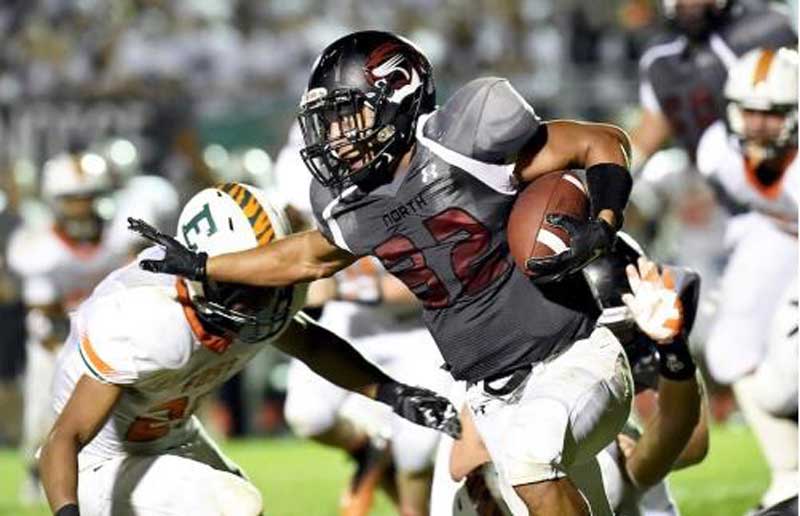
Quintin Hoosman gained over 2400 yards in his 10 football games this year (32 touchdowns). Quintin anchored my state-qualifying 4×2 team last year. All four relay team members return in 2015. Quintin holds our school record in the 30-meter block start (FAT) = 3.95 … At 190 pounds, his speed stats are equal to those of Kapri Bibbs of the Denver Broncos. Quintin has scored 32 touchdowns in 10 games but he does not have a D1 offer.
Every year, I attempt to recruit our best football players to the sport of track & field. Track does not sell itself. This article will focus on how I recruit athletes to the Plainfield North track program. Some of the things we do will not be universal. Hopefully this article gives track coaches some tools to promote your sport. Hopefully this article will help athletes and their parents to develop a balanced approach to athletic participation. The only adults promoting specialization are jackasses who benefit from specialization. All true educators promote balance. John O’Sullivan recently wrote an article that should be required reading for every parent, The Race to Nowhere in Sports.
With that being said, let me tell you about Plainfield North.
Plainfield North’s football team made the IHSA playoffs this year with a 6-3 record. We are good but not great. Our sophomores have won 18 straight (9-0 as freshmen & 9-0 as sophomores). My freshmen went 9-0 for the 3rd consecutive year and our freshmen coaches are riding a 30-game winning streak. The regular season ended with our combined three levels averaging 40.2 points per game. Our school is less than 10 years old. With an enrollment of 2130, we are the 69th biggest school in Illinois. After nine years, our football program is 42-43 and 0-4 in the playoffs, but great things are on the horizon. We have produced one NFL player, Kapri Bibbs, who is a running back with the Denver Broncos.
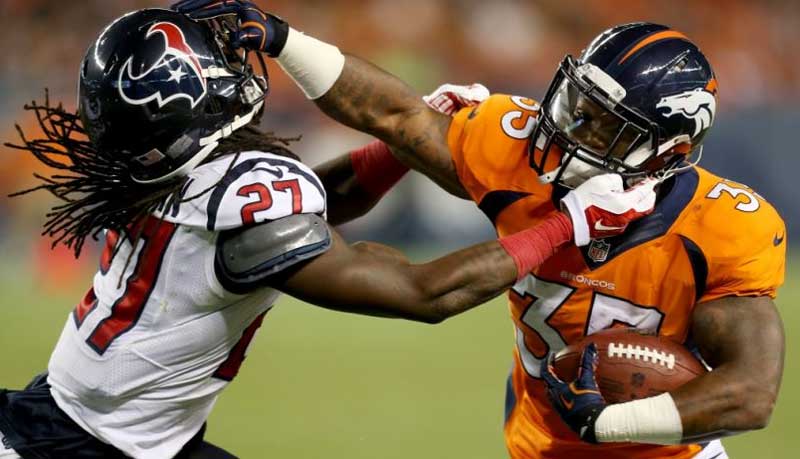
Kapri Bibbs gained 2646 yards and scored 38 TDs in his senior season at Plainfield North. Even more amazing, those numbers were accomplished in only NINE games. Kapri also ran track. His speed numbers: FAT 10-fly = 1.02 … FAT 30m block start = 4.03 … hand-held 40 = 4.35 … 100m dash = 11.04
Besides being the head freshmen coach, I serve as our speed coach in the winter and the head track coach in the spring.
Running is used as punishment in the ball-sports … “I’ll run your asses off !!!” … “On the line !!!” … “Put the balls away, we’ll just run !!!” … “Take a lap !!!”. Kids hate to run by the time they come to high school. In bad track programs, kids will whine, “Do we have to run today?”.
Track & field is a tough sell. A kid in our area is more likely to play lacrosse or hockey than compete for a youth track club. To make matters worse, the track & field experience at our middle schools is less than optimal. Here is the situation at our nearest middle school. The other seven middle schools in our district are basically the same.
- 250 kids (coed)
- 7 coaches
- 8 meets
- no track facility; just a parking lot and a grass field
- the season ends with the “Paw Pac Meet” (8 Plainfield middle schools) and not the IESA state track championship
The meets are nearly unmanageable. Kids are told to sit in a group in the stands until it’s time for their event. Imagine gray skies, 50 degrees, howling winds, and sitting on aluminum bleachers with a huge group of middle-schoolers. Negative experiences are hard to overcome.
Track coaches everywhere face significant obstacles. By sharing my challenges, I hope to help other coaches overcome theirs. The only way my track program can excel is through promotion and recruitment. We must work harder than the ball-sports. We need to keep our athletes happy. Happy athletes are the best recruiters. The ball-sports don’t recruit athletes because they don’t have to. Ball-sport kids have eager parents who have invested large amounts of time and money. Most of those parents believe a college scholarship is the light at then end of the tunnel.
My track program does not solely focus on the varsity level. We value freshmen & sophomores as much as we value juniors & seniors. One of our previous athletic directors believed freshmen should play their football games on the practice field, not the game field. He repeatedly told people, “No freshman ever won a scholarship”. He didn’t last long. Should we minimize the freshmen experience? Why should athletics exist for the benefit of upperclassmen? Should we focus on scholarships with a laser-like intensity? Do we minimize freshmen academically while we glorify seniors? Maybe I’m old school, but athletics should be a classroom, not a revenue-driven exercise in greed. Every kid should have a good experience, not just the gifted.
TEN REASONS TO JOIN THE TRACK TEAM:

YOU ARE NOT AS GOOD AS YOU THINK. Sorry but this is the truth. NCAA football scholarships go to freaky talent. At Plainfield North we’ve only had a handful of NCAA Division-1 scholarship football players. Scholarships are rare. Despite the fact that major college football teams give 85 scholarships, less than 1 out every 100 high school football players will receive a free college education. It may not be a good strategy to invest all of your time and effort in the pursuit of such a long-shot. Financial advisers encourage investors to take a balanced approach. Smart people never invest in the lottery. College football players are freaky-big or freaky-fast, or both. The size of your muscular-skeletal system is basically predetermined. Track is the number one way to improve your speed. Why not play a second sport?

SPEED KILLS. The most important football skill is speed. Like it or not, speed may be the key to getting recruited and the key to getting drafted. It is simplistic and fundamentally wrong to believe in weight gain as your ticket to the big-time. Yes, NCAA football players are big, but they not artificially big. 300-pound linemen are 6’5″, not 6’2″. 230-pound running backs are first and foremost FAST. Big and slow running backs went extinct 40 years ago. #Speedkills. If you want to improve your marketability, you should join the track team. Don’t be an idiot who hires a personal trainer two weeks before a football combine. Anyone who values the weight room more than sprint training probably has thick ankles and suffers from speed envy. Slow guys love the weight room.
Even big guys need to be fast. The top three tackles of the NFL Draft were taken in the first round at picks #2, #6, and #11. All three were huge and super fast in the 40 yard dash. #2 pick, Greg Robinson of Auburn was the 2nd fastest offensive tackle in the draft, running 4.92 despite being 6’5″ and weighing and incredible 332 pounds. #6 pick overall was Jake Matthews from Texas AM. Despite being 6’5″, 308, Jake ran 5.07 in the 40. The speed-star of the offensive tackles was Taylor Lewan of Michigan. Taylor Lewan was drafted #11 by the Titans. When you watch the 6’7″, 309-pound OT run the 40 in 4.87, you can understand what made him a first-rounder. Lewan was the FASTEST offensive lineman in the draft despite his enormous size.
The top guard picked in the draft (the only offensive guard picked in the first two rounds, #33 pick) was Xavier Su’a-Filo of UCLA. 6’4″ and 307 pounds, Su’a-Filo ran the 2nd fastest time of all offensive guards, 5.04.
The top center in the draft (the only center taken in the first two rounds, #43 pick) was Weston Richburg of Colorado State, the FASTEST center in the draft. At 6’3″, 298, Weston ran 5.10. The New York Giants wanted the fastest center available.

WHAT YOU MEASURE YOU IMPROVE. We measure everything. We use Freelap to measure fly 10-meter sprints. We time 40-yard dashes. We time 30-meter block starts. Our focus is on explosion, acceleration, and max speed. We time lactate workouts. All data is recorded, ranked, and published. Graphs are used to show improvement. And that’s just practice. Track meets pit the best against the best. When you run a 10.65 100-meter dash, every coach in America knows you are legit fast. The whole world knows you have the athleticism to play at Florida State, Alabama, Auburn, etc. You are what you do. If you lift weights, you become a weight lifter. If you focus on weight gain, you get fat. If you sprint, you become a sprinter. It’s your choice. See an article I wrote last year, “Inertia and Data-Driven Speed Training“.

YOU WON’T SIT THE BENCH IN TRACK. I love kids that play in the marching band, but football players are usually better athletes. You are strong, fast, and tough. There is a place for you on our team. If you are not good in track, you probably aren’t as good as you think your are in football. Join the team and get faster. We have 18 events. Almost all of our meets have a fresh-soph and a varsity division. Your participation is guaranteed. I will find a spot for you. Unlike the ball-sports, track teams are not breeding grounds for jealousy and pettiness. Your spot on the team will be based on measured performance, not based on the opinion of your coach. Every kid that’s ever sat the bench in a ball-sport has secretly hoped that a teammate would screw up. In track, we cheer for everyone, even our opponents. Track is not a zero-sum game. Your success is not based on your opponent’s failure.

TRACK IS NOT A “TIME ROBBER”. Ball-sports block out the sun. The time expectations are immense. Some teams practice three or four hours. Some teams require weight lifting before school. Most teams require 25 days of practice in the summer. Do you like selling cards or cookie dough door to door? My track practice will begin at 2:35 and you will be on your way home at 3:25. If you want to stay and lift weights, great. If not, OK. If you want to stay and work on hurdles, great. If not, OK. You can vacation in Florida over spring break because we don’t schedule practices on non-school days. We don’t have a summer track program. If you want to come to Speed Camp, great. If not, OK. Our fund-raiser is the Fast Cat 5K and 10K, so you will not sell door to door. Track will not block out the sun. You will go home every day with gas left in your tank. Enjoy the spring.

MIDDLE SCHOOL TRACK AIN’T TRACK. If you “don’t like track”, you don’t know what you are talking about. In middle school you did not practice on a track, you practiced on grass. Here, we practice on a 180-meter indoor track and a 400-meter outdoor track. In middle school you competed against other middle schools from Plainfield. In high school, we compete against the best schools from all over the state of Illinois. We run on the finest indoor tracks in the state: University of Illinois, Eastern Illinois University, and The Shirk Center at Illinois Wesleyan. We make two southern trips, Belleville West & Edwardsville, both overnight. We have only one coed meet. You will be treated like men and expected to act like men. We have 21 meets including the Top Times Meet (Indoor State) and the IHSA State Championship, a three-day, two-night trip. The best state championship in Illinois is the IHSA Track & Field State Championship at Eastern Illinois University. No Illinois state championship event draws a bigger crowd.
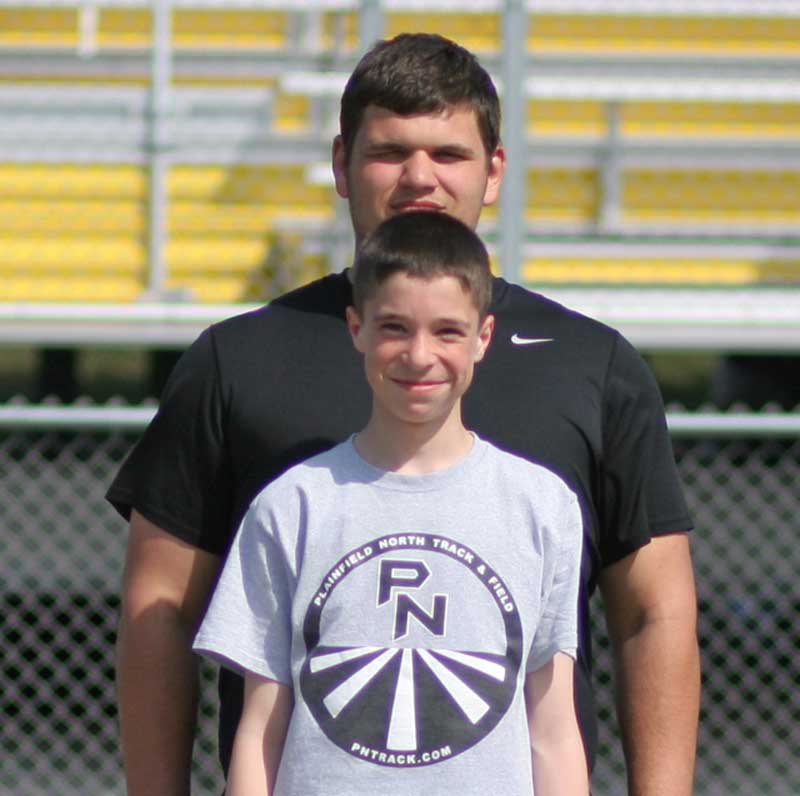
Our team includes distance runners, jumpers, sprinters, and throwers; ages range from 14 to 19. Only in track can two guys like Patrick Willhalm and Nick Wolf become good friends.

YOU CAN BE A VIP AS FRESHMEN. YOU CAN BE A VIP AS A ROOKIE. We have tryouts and keep between 75-85 athletes. Our 2014 roster included 28 freshmen. If you are a good football player, you will make the team. Last year six freshmen won varsity letters. Try doing that in one of the ball sports. It’s not uncommon for freshmen to make the trip to state as a competitor or a relay alternate. Last year, four freshmen made the three-day trip to state as relay alternates. We keep freshmen records. We give freshmen awards. Freshmen practice with the varsity every day. Unlike the ball-sports, freshmen are a part of the varsity program. Our coaches will know your name. You get the same attention as a senior. Our upperclassmen are taught to be good “big brothers” to our freshmen; you are the future of our program. Both of our over-night meets have fresh-soph relays, so our best freshmen will make the trip. In the past five years, we’ve had three rookies become All-Staters. Jayden Gerber quit baseball as a sophomore and ran lead-off on our All-State 4×1 in 2011. Randy Gordon had never played on a sports team but came out for track his senior year (2011). Gordon ran on All-State 4×2 and 4×4 teams. Like Gordon, Evan Flagg joined the track team as a senior, thinking he would be a high jumper. Instead, he anchored our 2012 All-State 4×4 team.
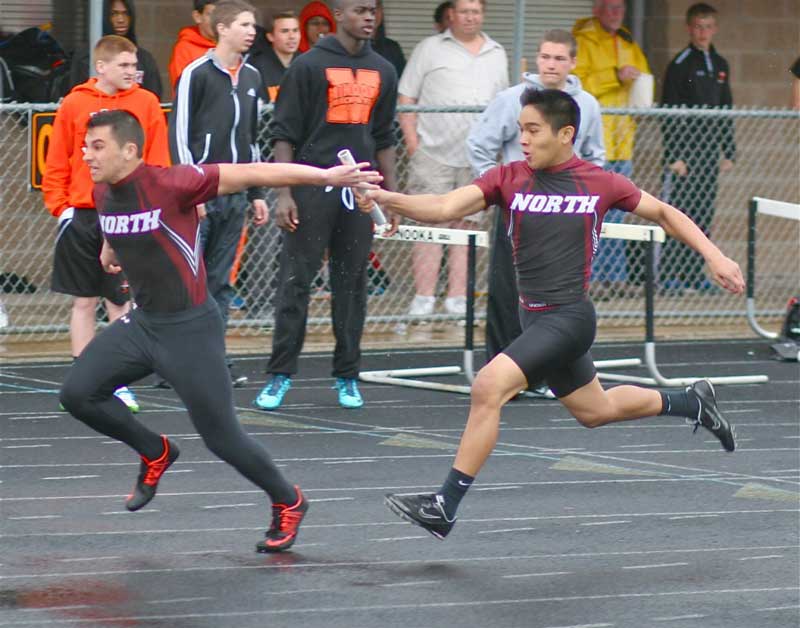
Our freshmen broke our school record in the Fr 4×1 (44.99). By the way, these two guys are outstanding running backs. The guy in front, Nico Capezio, long jumped 20’0, triple jumped 40’0, and high jumped 6’0, despite being 5’5″. #SpeedKills

YOU WILL BE A PART OF A TERRIFIC TRACK PROGRAM. We have sharp uniforms with lightning bolts on our sleeves and a tribal tiger on our back. We wear black. Our schedule is as good as any team in the state. Our website, pntrack.com, is loaded. Pictures are taken at every meet and posted. We have one of the most active twitter accounts in the state (@pntrack). Our coaches are the best. Coach John Singleton was a nationally ranked hurdler and has the longest dreads in the state. Our distance guru, Coach Andy Derks was an IHSA State Champion in the 1600 (1998). Derks ran the 2012 Chicago Marathon in 2:26.23, placing 53rd. Our throws coach, Sean Carlson was an All-State linebacker in high school and coaches the linebackers for the Plainfield North varsity football team. Our jumps coach, Dr. Brian Damhoff, is an A.R.T.-Certified Chiropractor and competed at Lewis University. If you played freshmen football, you already know me. We speed-trained last summer. You know it’s fun. You know my sprinters get fast. #SpeedKills

ATHLETES CHOOSE TO COMPETE. Call me crazy but I think football players need to compete more than nine times a year. What kind of athlete would choose to practice and train for 356 days and play only 9 times? The 2014 Big Ten recruiting class included 305 athletes from 14 teams. 89% of 2014 Big Ten recruiting class played multiple sports. 100% of Iowa’s recruits played multiple sports. In the 2014 NFL Draft, 222 of 256 players played more than one sport (87%) . Four out of every ten players drafted in 2014 were 3-sport athletes in high school. Only five of the 32 guys picked in the first round of the NFL draft were one-sport athletes. Alec Holler, track & football coach at Edwardsville says, “If you aren’t good in track, you probably aren’t as good as you think you are in another sport; so my advice would be to run track and get more athletic. You may think you are getting better with your personal trainer, but you’re not. One thing you can’t duplicate is the intense competition of a true sport.” I couldn’t agree more. Call me old-school but one-sport athletes are part-timers.

FACTS DON’T LIE. The following comes from a terrific website, trackingfootball.com. I spoke with one of the co-founders, Aaron Hunter, recently. “Track performance in itself does not always tell us a guy can play football, however it does show inclinations on who does not have the ability to play. Thus track performance is a great indicator of D1 athleticism.”
- Of all 2014 Big Ten football recruits, 59% ran track. 45% played basketball. Only 8% played baseball. 73% of Minnesota’s recruits ran track.
- 59% of the players in 2014 NFL Draft ran track. 49% played basketball. Only 6% played baseball.
- The top five quarterbacks in college football all have track backgrounds. Athleticism Is Key
- Most people consider Georgia’s Todd Gurley the top running back in the NCAA. Is it due to toughness and strength? Gurley ran the 100 meters in 10.70 and the 110 hurdles in 13.66.
- Sammy Watkins of the Buffalo Bills was the first receiver taken in the 2014 NFL Draft. Was Watkins #1 because of his soft hands and precise routes? Sammy Watkins is big (6’1″, 210) and fast. Watkins was the Florida state champ in the 200 meters running 21.11. Check this video from five years ago.
- Justin Gilbert of the Cleveland Browns was the first cornerback taken in the 2014 NFL Draft. Was Gilbert #1 because he had good football stats? Justin Gilbert ran 10.47 in the 100 meters and 21.29 in the 200 meters.
- The ESPN #1 ranked high school recruit of last year, Leonard Fournette, now plays for LSU. Fournette was #1 because of his athleticism (size and track stats). At 6’1″ 225, he ran 10.68 in 100, 21.57 in 200, 41.37 in 4×1, and 1:26.83 in 4×2.
- The #1 ranked wide receiver in college football is Rashad Greene of Florida State. Why? At St. Thomas Aquinas H.S., Greene ran the 400 in 48.27 and ran on a 41.60 4×1 team.
- Mike Singletary of the ’85 Bears was only 5’11” 230 pounds. 5’11” guys don’t get drafted unless they have something spectacular to offset their size. How about 63’6″ in the shot put? How about running the 4×1 despite being 230 pounds? Some people still think it’s all about desire, dedication, courage, toughness, etc.
- Last years #1 pick in the NFL was Jadeveon Clowney. Clowney was a good football player but there is more to the story. At South Pointe H.S., Clowney anchored a 4×1 team running 42.71. Jadeveon Clowney was 6’6″ 247 as a high school senior. By the way, Clowney played basketball too.
- The 2014 Alabama recruiting class included two of the nation’s top hurdlers. Marlon Humphrey (13.24) and Tony Brown (13.28). They weren’t bad in the 100 either, 10.63 and 10.37. Alabama also recruited six shot putters over 50 feet.
- The 2014 Auburn recruiting class included three shot putters over 55 feet and three discus throwers over 150 feet. Braden Smith threw 61’03 and 188’0. Auburn also inked 3-sport athlete Roc Thomas who was a 5-star recruit. Great running backs are great track athletes … 100 meters 10.94, long jump 21’7″, high jump 6’04”.
- The 2014 Oregon recruiting class included three big-time sprinters, Justin Hollins 10.52, Tony James 10.52, and Charles Nelson 10.58. Sprinters like these are worth their weight in gold.
- The 2014 TCU recruiting class included six guys who ran on sub-42.00 4×1 teams (41.55, 41.10, 41.29, 41.24, 41.44, 41.24). TCU is currently ranked #7 and leading the NCAA in points per game, 50.4. TCU is scoring 25.3 points per game more than last year. #SpeedKills
- The 2014 Georgia recruiting class included three sub-10.70 sprinters. Nick Chubb was one of them.
I was asked if #UGA RB Nick Chubb might be a bit stiff. No, he's not. Here he is showing that 40-inch vertical. pic.twitter.com/kgnlgbbncd
— Radi Nabulsi (@RadiNabulsi) May 13, 2014
This tweet went viral last spring. Football coaches who don’t attend track meets just don’t get it. Every track meet is a showcase of athleticism. You think these guys might be able to play football?
Tracking Football has observed a track emphasis in the South. In SEC football country, skill athletes are expected to run track. When comparing the top schools of the Big 10 and SEC, the numbers look about the same with the exception of the average 100 meter dash time. Any track coach understands that 11.15 makes 11.36 look slow. Maybe the attention the SEC pays to track is making the difference.
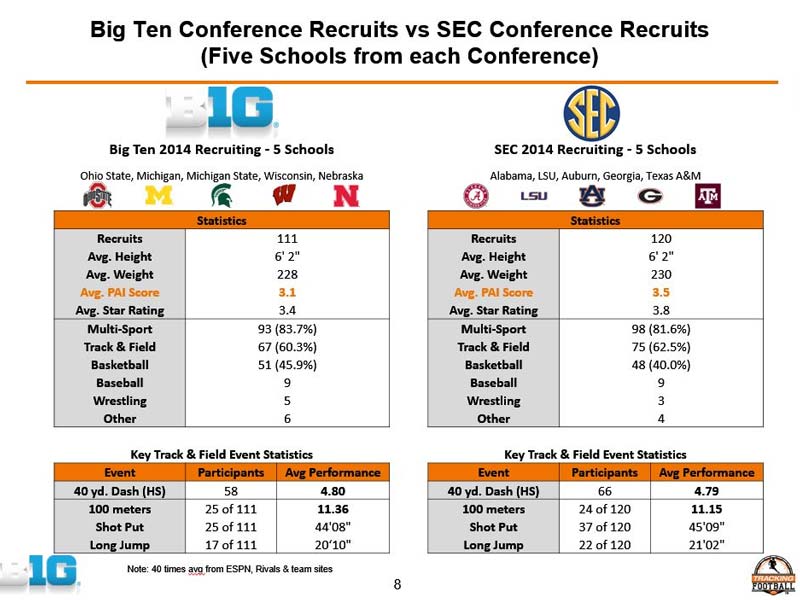
The PAI (Player Athletic Index) may revolutionize college football recruiting and NFL scouting. The PAI is a trademarked formula that takes into account height, weight, and track stats. Tracking Football is proving that track statistics are strong indicators of athleticism. For example, Adrian Peterson is 6’2″ 217 and ran 10.33 in the 100 meters. Peterson has a PAI of 5.0. Bo Jackson was 6’1″ 227 and ran 10.44 in the 100 meters. Bo also had a PAI of 5.0. Kapri Bibbs of Plainfield North and the Denver Broncos has a respectable PAI of 3.5. Kapri is a great football player but he’s not Adrian Peterson and he’s not Bo Jackson.
People working in Las Vegas are now paying attention to Tracking Football’s PAI. Teams with a high Player Athletic Index seem to win games.
Enlightened football coaches have always known the symbiotic relationship between football and track. The Player Athletic Index will eventually simplify college recruitment and NFL scouting. Coaches will not have to rely on inaccurate 40 times at some one-day combine. Track & field statistics will become the quantifier of explosiveness and speed. If you are big, strong, and fast you will get noticed no matter where you play or who coaches you.
Should you spend your off-season gaining weight and improving your bench press? Or should you join the track team? The decision is yours.
Please share this article so others may benefit.
[mashshare]


Perfect! Thank you for this.
Dave Kerin
Chair,
Men’s National Team Development
USATF
A simple answer is HS dont give a dam about track in my HS their were no letter jackets even though we won trophies no one showed up at track meets and no one in school could give a dam you won first place at a meet. But those of us who ran track in high school might have been no bodies in school they were winners in life
Awesome and we’ll written article. I love data and supporting facts with true accounts of real life. All three of my girls have ran track and a little basketball. One thing is for sure if you can run correctly, it’s the foundation for a lot in life and sport too. If I have grandson s I’ll push this premise on my daughters.
I couldn’t agree more! Great read!
FANTASTIC ARTICLE!!!!
Tony,
Great article! As usual you did an excellent job of writing about the subject.
I’m going to post it in my locker room.
Great read coach. Good to hear of your successes. Keep them running.
Great article Tony. So many of your struggles sound so familiar! When you aren’t a member of the “Big Three” ( baseball, basketball, football) you are an underdog! Being a soccer coach is very similar. Our football coaches have ran off several great kickers because they wanted them to “specialize “. Yet, one of my son’s former soccer team mates is kicking for Ohio State as a freshman (Sean Nuernberger). Soccer players run an avg 7 miles in a game 3 times a week. My oldest son broke his femur and was airlifted from the playing field in Carlyle. And the soccer players for years have endured the “Grass Fairies”name calling in a “zero tolerance” “no bullying” academic setting! You’re a class act, Tony! Keep up the hard work!
You couldn’t have explained it better coach!!!!
Old putz (72) fan of great coaching here. If I were 60 years younger I would certainly sign up to join your track team.
If only for this: “We need to keep our athletes happy. Happy athletes are the best recruiters.” This exactly mirrors the coaching philosophies of Bill Aris, whose boys’ and girls’ XC teams won NXN Nationals this year, and Mike Scannell, coach of Grant Fisher who won Footlocker 2014. Both are focused on very efficient training. Aris spends 80 percent of his time not planning workouts but getting to know and motivate each runner; under Mike Scannell, Grant Fisher ran just 50 mpw max and did NO speedwork, while running a 4:02.3 mile and winning Footlocker. Scannell emphasizes what’s best for the individual runner – his boys go home smiling and never, ever burned-out.l
Very interesting insights and stats on cross-sport athletes and success. It works that way in other sports, too. Increasingly, we’re seeing elite HS runners who come from dual-sport backgrounds in triathlon, swimming, etc. (e.g., Lukas Verzbicas who ran sub-4:00 in HS; Jorday Hasay, who swam competitively until, I believe, her junior HS year).
I loved reading about this program. Also, the comment that football may be dead in 50 years. I wouldn’t mind at all – let’s replace it with a skills game that doesn’t cripple players for life, that involves every kid, and isn’t a sport played for 15-20 minutes over a 3-hour time frame as a fleeting break between advertisements. Have you ever watched flag football played at a very high level by NFL-caliber athletes? It’s a fantastic game.
I played HS football and track for a coach who spent not one minute in the entire season giving us instructions on technique or making the slightest attempt to motivate us. Yes, it was unbelievable. Happy to read that the times have changed.
Awesome article that demonstrates the usefulness of track & field towards other sports. Speed will only enhance your performance in any other sport. Well written!
Thanks to all of you who have commented on this article and shared it with others. This article has been many years in the making.
I read every comment and appreciate the feedback.
For those of you who like the football-track connection, make sure you check out https://www.freelapusa.com/13-things-that-confuse-slow-people/
For those of you who coach, please read https://www.freelapusa.com/how-12-coaches-impacted-my-career/
You may want to give me feedback on why this article, https://www.freelapusa.com/teaching-science-and-coaching-sprinters/ had only 21 shares. I really liked it and so did the 21 people who read it. Ha. Ironically, this was the article that preceded the record-setting “10 Reasons to Join the Track Team”. Crazy.
Keep reading & let’s make Track & Field the sport is should be !!!
Coach Holler or my Biology teach@ Harrisburg 20 years ago. I love your blogs.
Thank you! Amy who?
Great article coach! Running is the foundation of all sports. You would think it’d be a no Brainer to have your child in track and field… Right ?!?!?!
No brainer but it’s a yearly battle for every track coach in America.
I couldn’t agree more. When I went to high school, I was a 3 sport athlete. Softball had been my spring sport for junior high and the softball coach was recruiting me to continue on in the sport. The track coach also made it clear he would love to have me join their squad. What sold me on track was the great camaraderie that the track team had. I was taken under the wing of some great upper classmen. The encouragement of my team was unparalleled even when I was running faster times than they did. I then always looked forward to track season. It was a great season in which I got away from that petty jealousy that would occur in soccer and basketball season when an underclassman showed greater skills.
I took these lessons to heart and learned to appreciate the talents of others and encourage them. In the end, no matter what the sport, we compete against ourselves to perform the best we can. I would never want to win any type of contest because my competitor had a lousy game, hurt herself, or just had an off day. To know I was able to perform better than my last time out as both an individual and a team is really what excites me when I play sports.
Baseball is huge in my area too, and I am a great baseball lover. The points have been put here so beautifully that they truly justify the reasons to join the team.
Thank u — i was on the fence about what i wanted to do but i think i want to coach track === thanks
Not bad. Sad u are so negative. As one of those ‘washed up has beens’ I make my living helping kids get faster and open coaches eyes at the collegiate level. In this crazy competitive collegiate acceptance world, sometimes it’s not the money but the getting into the school that is the goal. But I am a huge fan of 2-3 sports and ran track & football through college and believe that each made me better at other. Maybe next article spend less time banging on guys like me and more cool stuff.
Wow, what a one sided propaganda laced bitter attempt of bad mouthing every other sport to recruit track kids! And what better conflict of interest to do it than by a head track coach who is also a football coach! The benefits of running track do not outweigh the benefits of playing other sports that require hand eye coordination. You can take your numbers and twist them however you’d like to make them fit your article. What’s even better is there are actually people out there that believe you and eat this stuff up. Just like with education, you can get the data to tell whatever story you want.
You mention how short your practices are. You’re right, they should be. While other sports focus on so many other aspects of the game and competing, track focuses on only one aspect of football. Then with all the “down time” at meets, you all have plenty of kumbaya time for each other and your camaraderie because you sprint for ten seconds and sit around for four hours.
While those on track and field may find this article helpful, those of us “ball sport” coaches find your short-sightedness detrimental and disrespectful to what we as coaches are trying to do. Don’t think for one second that you work harder than I do or care about your players more than I care about mine or even put your sport on a pedestal to make it appealing to recruit kids. You do need a leg up, track is not the answer to a football scholarship like you guys love to preach in your sales pitches. Your AD should look at this as a complete conflict of interest and not allow you talk like this about the other programs at your school. Track is part of the problem today in sports. Everyone gets a medal, you are all valuable, blah blah blah. No you got cut from Lacrosse, or you aren’t a good enough athlete to play baseball, so go run track. That’s the truth. Speed does not make you an athlete, it is only one aspect so please stop preaching this bullshit just to get kids to come out for track. When the other spring sports are done fielding their teams, there will be plenty of “track athletes” available, especially at a school your size.
As a member of the PNHS track team of 3 years and counting, I can assure you sir, you are full of sh*t. Excuse my language coach Holler, and although you may not appreciate me replying before you get the chance, I felt it necessary for us to stand up for our program. Among my peers, I’d say 9/10 of them compete in another sport besides track. Never have I seen Coach Holler discourage another athlete from choosing between track and another sport, or frowning upon one. When I am at practice, I see a diverse group of individuals. Basketball players, baseball players, soccer players, lacrosse players, or kids who look like they’ve never played a sport in their life. But I can say one thing for certain about these people, no matter what sport they are involved in outside of track, THEY GET BETTER. You sir, may downplay the numbers and statistics, well you can go ahead and throw them out the window. You don’t need them, you can physically see the improvements in the athletes. Kids who are here their first year tell me how they can physically feel themselves improving, getting stronger, faster, more coordinated. With track, we are not all about speed and focusing on only one aspect of a sport. We are constantly focusing on different things such as agility, balance, strength, which all happen to contribute to getting faster. You may say coach has a biased opinion, and you’re right. He has been coaching for so long, physically watching kids improve from the way he teaches. The evidence is there, ask any coach at our school how much better their kids are at any specific sport after joining the track program. Our team is a family, just as any other team is. We encourage each other to improve, as well as teach leadership and other valuable life skills. Never have any students been taught to be discouraging of other sports or activities. Track is not superior to any other sport, nor does it take priority. Speed may not make you an athlete, but it does help you to become a better one.
Mr. Chones,
Thank you for taking the time to write this thoughtful response to my article. I’ve never made a penny for anything I’ve written, but the fact that people take the time to read my long-winded ramblings makes my effort seem worthwhile. For someone to read 5000 words and then take an hour to write a response, wow!
I have to admit, after reading your post, I wanted to punch you in the nose. However, at age 57, I’ve learned it’s better to get a good night’s sleep before responding to an attack. My friend, Latif Thomas, read your opinions and tweeted, “That guy makes some very valid points. Track & Field coaches will dismiss them but that’s why it’s a dying sport.” I have to admit, I initially saw no valid points in your post, so I had to re-read it. In a way, it’s very similar to a Bernie Sanders guy (like me) trying to make sense of someone who attends Trump rallies.
I believe you show more bitterness in your first sentence than I show in my entire article, but that’s just an opinion. I will try to stick to the facts.
There is no debate, college football players typically ran track in high school. You can’t find evidence for any other conclusion. Football is a speed and explosion sport. The #1 most-important test done at the NFL combine is the 40 yard dash. Every position with the exception of quarterback and kicker values the power and speed demonstrated by the 40. I could drop the mic there and walk away but I won’t.
As a football coach, which athlete would you choose?
a) strong, fast, poor shooter in basketball, low batting-average
b) weak, slow, good shooter, high batting-average.
Most football coaches would love to have that strong, fast kid. Personally, I want both guys. The majority of my track kids can’t shoot and can’t hit. Basketball and baseball are both year-round sports in the Chicago area. As a football coach I want all athletes on my football team: track, basketball, baseball, etc. As a track coach, I get football players and cross country runners. If we get lucky, we land an occasional wrestler, marginal basketball player, rebellious lacrosse athlete, a soccer refugee, or a fast trumpet player. The diversity of kids on a track is something to behold!
In regards to me “taking numbers and twisting them” to support my ideas, I respectfully disagree. If I presented statistics showing specialization as being a key to success, that would be twisting. If I presented numbers that showed college and professional football players were mostly specialists in high school, I would be twisting the facts. By the way, did you see where 45% of Big Ten recruits played basketball in high school? If you would re-read my article, you might discover a multi-sport theme written by a guy who coaches football and track.
I totally agree with your point about statistics in education.
Track practices are short, I agree. As a father of four, I appreciated track season when my kids got home at 4:00 instead of 6:30. I watched my sons come home from football and basketball practice too tired to eat. I have nothing but respect for the coaches and athletes who work three or four hours after school every day. I don’t know how they do it.
Track meets are long, I agree. I think this was one of Latif’s “valid points”. After tryouts and cuts last year, my boys track team still had 105 members. If track teams consisted of 20 players like baseball, we could shorten our meets. A long meet pushes five hours. Short meets are finished in less than 3 hours. States with coed track have meets of 5-8 hours. I don’t think I could coach in a coed track state.
In regards to the “Kumbaya” of track & field, you hit the nail on the head. Track athletes don’t seem to hate their opponents. The zero-sum game of the ball sports often create animosity between teams. Football and basketball coaches understand the dog-eat-dog world of winning and losing. One team tries exploit the other’s weaknesses. One team tries to make the other team look bad. Track is different. Personally I love the friendly relationship I have with track coaches from other schools. We don’t actually hold hands and sing “Kumbaya” at track meets, but you are right, we do so in spirit.
Another point of agreement: football, basketball, and baseball coaches are the hardest workers I know. I wrote an article once called “How 12 Coaches Impacted My Career”, 10 of the 12 coached football, basketball, or baseball. My father was a basketball coach for 47 years. No one worked harder. No one cared more about his players.
If you think I put track on a pedestal, I have to disagree. I don’t think the words track and pedestal have ever been used in the same sentence! Track is the step child of high school sports. Parents are willing sell their soul to football, basketball, and baseball. Sometimes my track athletes are like orphans. Parents don’t attend many meets. But I understand, track meets are so long!
The fact that 60% of all college football players ran track in high school is not a sales pitch, it’s a fact. If I was telling athletes that hitting a baseball has a direct correlation to becoming a college football player, that would be a sales pitch with no factual basis.
My athletic director encourages me to promote my track program. He is thrilled that kids at Plainfield North speak highly of track. I don’t think he reads my articles.
I have to disagree with your “Track is part of the problem today in sports. Everyone gets a medal, you are all valuable, blah blah blah.” Please get your facts straight, only the winners get medals. Only the best qualify for state. Only the elite medal at the state meet. If you are upset that track seems to value every kid, you’re pretty weird. When an introverted freshmen places 9th in the mile but breaks 5:00 for the first time, we get pretty excited. If that’s a bad thing, we are guilty as charged.
I don’t understand your statement about getting cut from lacrosse or baseball. Are you saying that only losers belong on the track team? I hope not. I believed track is a proud sport, just like lacrosse and baseball.
In a final point of agreement, speed does not make you an athlete. In my humble opinion, speed may not make you an athlete but speed is one of the pillars of athleticism. Speed might be the #1 most-important skill in football and track (thus the article above).
Were you fast? Maybe I should drop the mic right now.
All kidding aside, if you are ever in the Chicago area. Look me up and I’ll buy breakfast. People of different opinions need hear each other out.
Keep reading.
Tony Holler
630-849-8294
Bob Chones. ,plain and simple, you are an idiot. Ed Reed, Santana Moss, Sinorice Moss Devin Hester, Andre Johnson, Willis McGahee, Sean Taylor, and Roscoe Parrish all starred at Miami and ALL played in the NFL, they also were h.s. Track stars as well as big contributors to Miami’s Track team. You probably haven’t coached an athlete near the caliber of these mentioned, while developing sport skills our crucial, everyone is always looking for someone with speed. There is a reason there is a growing number of college strength and conditioning coaches attending the U.S. Track and Field/Cross Country Coaches Association annual convention…….because speed kills…..period and these people period point blank want to learn about how to train and develop speed
Now there’s a bitter comment. I find it pretty conflicting how you say, “Don’t think for one second that you work harder than I do or care about your players more than I care about mine…” and then say, “Track is part of the problem today in sports. Everyone gets a medal, you are all valuable, blah blah blah.” So you care a lot about your athletes…but do not think they are all valuable? You think telling all the athletes that they are valuable is part of the problem? Wow.
I just want to state for the record that all the members of my teams have value. Even the ones who got cut from lacrosse or are not athletic enough to play baseball. I am sorry coaches like Bob Chones do not feel that way.
Oh my goodness.
Bitter much.
I found the article interesting as a first year (volunteer) Throws Coach. Oh, I am a parent volunteer. I thought gymnastics and believed that it provided a foundation for many other sports as all who take classes will not go on to become collegiate gymnasts or are buns for the Olympics.
Take the information for what it is and not for what you cannot comprehend. A simple sport support sport concept. The hidden benefits is that your efforts are measured and are not subjective. Also, the sportsmanship and comradary.
Your reply was not very kind. I sure hope this trait is not displayed as you coach impressionable students.
What you say and do matters.
To Mr. Bob Chones above.
I’m going to post two links for you. I want you to watch them both and tell me what the difference between the two is.
Here is link one- http://www.hudl.com/athlete/2665600/highlights/322615380
Here is link two-
http://www.hudl.com/video/3/2665600/5813cce6ed57ee08809450b0
You want the answer without watching? Track is the answer. This kid quit his National Championship 7on7 team and the lacrosse team to join the track team and get faster for his senior season of football. Kid ended up being on an All-State 41.92 (school record) 4×100 team. If you can sit there and tell me track didn’t make a difference then you’re full of it. I forgot to mention he is our most popular senior with college coaches who stop by for recruiting visits. He’s going to be an impact player at a college instead of an average player. Speed made him elite and track changed his life. Guess what he came back out for his senior year? Track because he had a blast and got faster while doing it.
Coaches like you are part of the problem. You don’t promote the full development of kids because you think strength and size are the only answer in ball sports. Of the 4 kids on that 4×100 I talked to you about all four of them were football players. 3 of them were All-Conference players. 2 of them, returning seniors this year just got named All-Area in football. The two who graduated are collegiate athletes. One of them runs for the University of Illinois and the other plays football and runs track for Minnesota State (he decided not to go out for a 7on7 team his junior year for track). Both of them got scholarships and my two seniors this year will get scholarships to college. Between the 4 of them they broke 11 track school records last year. But according to you track is the problem right?
Oh and if you need my resumé to make this all legitimate. I started coaching football eight years ago and started coaching track alongside that four years ago. I’m a ball coach who fell in love with track and saw what it can do for athletes. We promote track at our school because it changes kids’ lives. Call me crazy coach but I think you lost this one. Let me know if you need anymore film to change your mind Bob.
I will say this, Tony’s work speaks for itself. As evidence of PN’s runner up finish in football this year! PN has a FAST & athletic team and this is due in large part to his dedication to developing athletes.
Coach Chones, to lay the claim that Track and Field athletes are somehow sub athletes to the ball sports is amazing to me! I will put any good track coach athletes against any all star ball sport team. Want to know why because the track team is an All-Star team it brings the best of a high school athletes from many sports on to one team.
I do not cut I have between 150-200 male athletes each year in a high school with 1800 kids! They are the best of the best! Track is oh so much more than sprinters. I challenge you to compare any one skill in any ball sport to executing a clean discus throw or a beautifully executed pole vault attempt! Let’s not forget the high jump, shot put, hurdles, long jump and triple jump want to see grace and athletism. Come watch a track meet!
What’s wrong with world….everyone gets a metal. Really? How many national champions ball sport championships happen each season. Literally thousands! Want to see true American Grit watch a great field of 25 distance runners run the 3200 on an 90 degree day. Want to see 9 minutes of pure pain! Watch those kids run and then come talk to me about athletism, and grit.
And the best thing that Coach Holler already elaborated on is there is a spot for all kids. You don’t have to have a lot of money to participate in track and field. Just the ability to toe the line, step into the circle or hop onto the runway and expose yourself to bettering your last attempt.
I’m not as politically correct as Coach Holler. If one of your kids come and asks me about Track and Field I will try my hardest to erase 10+ years of brainwashing and tell them about all the great things about my sport! Better yet I’ll let my ATHLETES do the talking.
Honestly, the fact that you said speed isn’t important to athleticism shows me you are not a very knowledgeable coach. Without being fast you cant be elite in a majority of sports. I am not going to give numbers because the people above have plenty.What does bother me is how you bash Tony Holler. You personally don’t know him, nor do you know what he has done for his athletes. I can tell you that Tony is a great coach and mentor that cares for his athletes like no other.I can promise you he cares for his athletes more than you. Tony’s promotion of track is because he loves the sport and has the facts to back up his claims. So before you go on a rant next time maybe be more polite and less naive.
Coach Chones:
“When other spring sports are done fielding their teams there will be plenty of “track athletes” available…”? That comes across really poorly. It reads like there’s no possible way a kid would choose track over another spring sport. And the quotation marks around Track Athletes doesn’t help. It comes across prejudiciously against kids who do track as well. As a coach & educator (I’m assuming) that’s probably not how you are with your students & athletes. Be careful telling Coach Holler’s AD to remove him because of his pro track bias. If my kid were a track athlete in your class, I’d be uncomfortable with it not because you are anti track, but the way that you express how anti track you are.
It also seems like you’re taking a zero-sum approach. The kids can play a ball sport OR track. Obviously in the spring they have to choose but I’ve coached a lot of track kids who also played ball sports. And as a coach myself I’m firmly in Coach Holler’s corner. I can count on 1 hand the high school sports where speed, explosiveness, jumping ability, et al are not desirable. (golf and bowling maybe?)
I’ve coached x-country and track at the hs and ms levels. I’ve had some football coaches who were dead set against their kids doing anything but lifting in the off season. But one of the most enjoyable stretches I had was when the head football coach became my asst track coach. He was a little surprised when I told him that it was fine if his football players did their football weight room plan as their spring track lifting. I told him that it was all about developing explosiveness and if I had any additions I’d bounce it off of him but I certainly wasn’t going to ‘outlaw’ anything his kids were doing . We had a great rapport and more and more of the football kids came to track.
To be honest, I’ve had coaches of other sports discourage kids from doing anything but THEIR sport in the off season. Basketball, soccer, swimming, baseball; you name it. After 23 years of coaching I still question the ethics of some coaches who push specialization only. I have too many of these types of stories. An 8th grade girl basketball player whose 8th grade track times would’ve qualified for the state finals at the high school level who was told by AAU coaches not to waste her time with track. (she wasn’t one of the top 10 hs guards in the state as an 8th grader) A third string 8th grade soccer goalie who (on sparse training) ran a 5:08 mile and considered x-country until the varsity soccer coaches convinced him he’d probably be the starting jv goalie and maybe end up on the varsity bench the next season (in a hs of 2000 kids). But the kid heard what he wanted to hear and walked away from a promising running career to specialize in soccer and ultimately never left the bench. And a bunch more like that. We’re in this for the kids. When kids aren’t sure I present the evidence to the kids but let them choose.
The stopwatch has settled so many issues for me. Johnny isn’t on the relay over Billy because Johnny is my neighbor. It’s because Billy is the 7th best in that event. And by keeping in season depth charts that change weekly, the kids see how they are improving. Speed, explosiveness, endurance, technique are all measurably improving as the season goes on. And the objectivity that I’ve seen breed resentment in ball sports over who is starting isn’t there in track. I think that’s part of the kumbaya of it. If you made the relay and I didn’t, I know it’s because you’re legitimately better and while I’m then a disappointed teen I’m not a resentful one.
The thing that all of us can agree on is the meets are long. I’m enjoying “semi-retirement” coaching jr high kids and a big part of it is the length of the meet. When the high school level added triple jump and girls pole vault I lasted about 2 seasons. I’m pro title IX but PV ties up the runway and (only my opinion) a lot more girls aren’t ready to vault in prime time compared to the boys, and I don’t think adding TJ at the hs level was helping anyone.
I can’t help you with the “medals for all” thing. There is a lot of it in society and it’s a problem in some respects. But with teens whose self esteem can be up and down, I can live with it to a point. I’ve had a lot of glorious moments when a kid FINALLY breaks that 5:00 mile or whatever. Winning in sports is supposed to help these kids with winning in life. And in life, victories come in many shapes. I won’t ever be a bodybuilder, but I can drop 15 lbs and feel good about myself. How do we define winning? And if we can’t ‘win’, do we run the risk of teaching kids not to try? At some point trophies for all ain’t helping, but define winning first.
Coach Chones, it’s been about a month since your post. If you’re able, I’d love to dialogue with you here. I think we learn from others’ differences and similarities, and I bet we have more similarities than we realize.
And Coach Holler, if you’re ever in central NJ, lunch is on me.